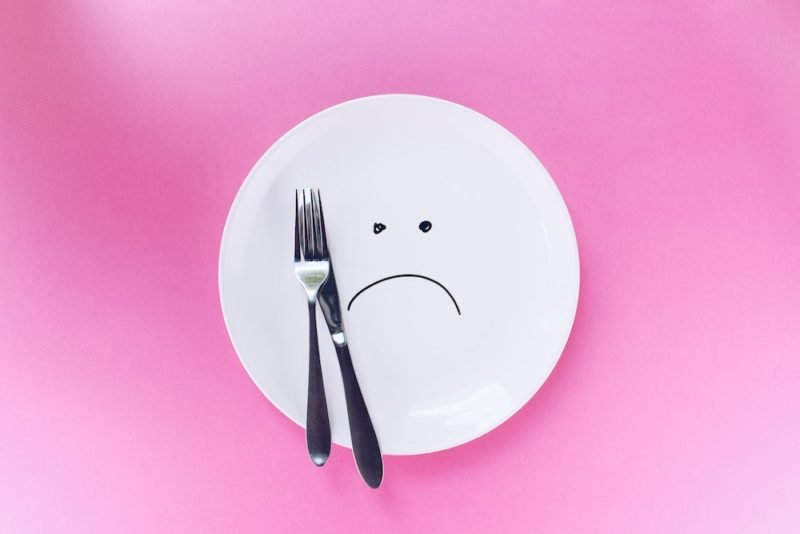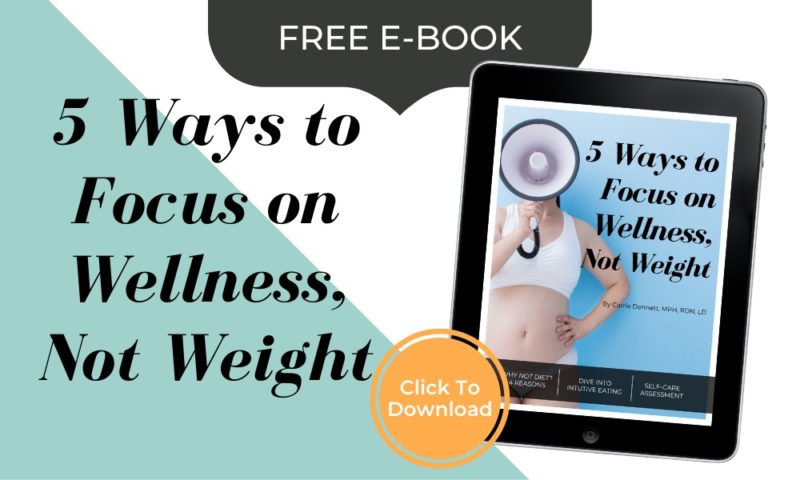
It’s a comment I hear a LOT: “I can’t stop eating!” There’s usually a lot of frustration and even fear associated with that statement — along with profound feelings of failure. It’s easy to think you are somehow broken if you find yourself feeling out of control around food, but you’re not. That doesn’t mean that something doesn’t need to change — clearly, if you’re distressed then change is needed — but that “something” may not be what you think.
Restriction: the “solution” that’s really a problem
Your body has biological mechanisms in place to keep your weight from dropping below a certain set point range, whether you are experiencing famine or what just looks like a famine—aka calorie-restricted dieting. One is a drop in your resting metabolic rate beyond what can be accounted for by simply weighing less. The other is an increase in appetite.
Even though the body needs fewer calories as weight decreases, hunger and the drive to eat increases. In fact, increases in appetite may play a more important role than a slowing metabolism in weight loss plateaus. For each kilogram (2.2 pounds) of weight lost, we burn about 20 to 30 fewer calories per day, whereas appetite increases by about 100 calories per day. Basically, it’s easier for your body to protect itself by increasing your appetite—and your calorie intake—than to slow your metabolism and run on fewer calories.
The solution: Stop dieting, and investigate intuitive eating.
A gut microbiota that’s not very diverse
You gut, and the microbes that dwell in it, act as a “mini brain,” influencing, among other things, mood, appetite and food cravings. The tens of trillions of bacteria and other microbes in our gut produce a number of compounds, including some that are identical or similar to appetite hormones. On one hand, about 20 minutes after a meal, certain bacteria in your gut send signals that you’ve had enough to eat by stimulating the release of a hormone that has been linked to feelings of satiety. On the other hand, if you don’t have a very diverse microbiota, other species can become dominant, and what they need to survive and thrive may be different than what your body needs.
When you and a dominant group of microbes aren’t on the same page, they will try to manipulate your eating behavior for their benefit. They may cause cravings for their preferred foods, or for foods that suppress their competitors. They may simply increase your hunger levels until you eventually eat what they want you to eat. Either way, this creates a vicious cycle. For example, if you eat a lot of sugary foods, “sugar-loving” microbes will thrive, whereas microbes that don’t do so well on sugar may weaken or die. Because the “sugar-loving” microbes are well-nourished, they’ll gain even more influence, increasing sugar cravings. (Note: I said A LOT of sugary foods. In no way am I saying that you should avoid sugar 100 percent. That would be sad.)
The solution: Support a diverse microbiota by eating foods rich in fiber and probiotic bacteria, being physically active, handling stress and getting adequate sleep. This reduces the chance that any single species will have the numbers to gain an upper hand, and so may help reduce food cravings and unusual hunger.

Lack of quality sleep
Chronically skimping on sleep can lead to increased hunger and carbohydrate cravings, possibly due to loss of REM (rapid eye movement) sleep. Results of a 2015 study published in the journal Sleep Medicine suggest that the loss of our final REM sleep cycle of the night, specifically, may lead to increased appetite. This is an issue with people who get less than six hours of sleep, because the final REM cycle begins around the six-hour mark.
We get energy from sleep, and we get energy from food, but those two types of energy aren’t interchangeable. That said, when we’re dragging because we’re not sleeping enough, or not sleeping well, our bodies and brains will make a frantic grab for any type of energy it can get, to our detriment.
The solution: Getting to bed on time, or getting professional help if you struggle with insomnia

Emotions, deprivation and scarcity
I wrote an entire article about emotional eating for The Seattle Times a few weeks ago, so I’m going to link to that here (“Why emotional eating isn’t as straightforward as you think”) rather than repeat what I wrote. I will add that there’s one aspect of emotional eating that many people don’t think about, and I’ll admit it was something that I didn’t think about until I heard dietitians Evelyn Tribole and Elyse Resch, co-authors of the book “Intuitive Eating,” speak in October.
Resch talked about “the sadness of ‘enough,’” which can sometimes explain why people have trouble stopping eating even when they know they are full. She posed the question, “If you know you are full, and you keep eating anyway, what is that food doing for you?” Resch wrote an article on this topic several years ago, which some of my clients have found eye opening when I shared it with them.
I mentioned at the top of the post how food restriction can increase the drive to eat, and this plays into emotional eating as well. So does deprivation, which can come from avoiding so-called “forbidden” foods or from the lingering effects of food insecurity. Restriction and deprivation can lead to a “scarcity” mindset. If you have a scarcity mindset you can become very uncomfortable at the mere idea that there might not be enough food, or enough of favorite foods. This can cause overeating or even binging out of desperation. I also wrote about binge eating disorder recently for The Seattle Times (“Why willpower is not the antidote to binge eating disorder”).
The solution: Intuitive eating to help you make peace with all foods, and mindfulness to help you increase awareness of what exactly you’re feeling and what exactly you need (which may have nothing at all to do with food).
Disclaimer: All information provided here is of a general nature and is furnished only for educational purposes. This information is not to be taken as medical or other health advice pertaining to an individual’s specific health or medical condition. You agree that the use of this information is at your own risk.
Hi, I’m Carrie Dennett, MPH, RDN, a weight-inclusive registered dietitian, nutrition therapist and body image counselor. I offer compassionate, individualized care for adults of all ages, shapes, sizes and genders who want to break free from eating disorders, disordered eating or chronic dieting. If you need to learn how to manage IBS symptoms with food, or improve your nutrition and lifestyle habits to help manage a current health concern or simply support your overall health and well-being, I help people with that, too.
Need 1-on-1 help for your nutrition, eating, or body image concerns? Schedule a free 20-minute Discovery Call to talk about how I can help you and explore if we’re a good fit! I’m in-network with Regence BCBS, FirstChoice Health and Providence Health Plan, and can bill Blue Cross and/or Blue Shield insurances in many states. If I don’t take your insurance, I can help you seek reimbursement on your own. To learn more, explore my insurance and services areas page.
 Print This Post
Print This Post







